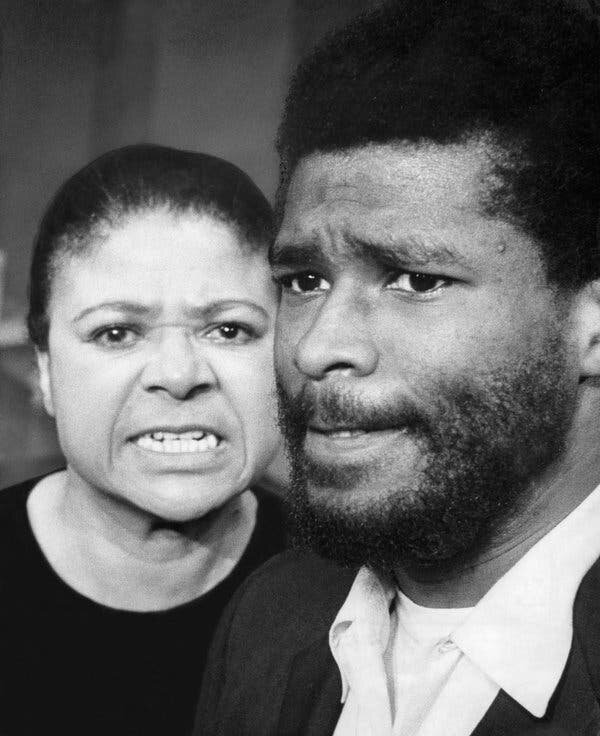Gertrude Hadley Jeannette became the first woman in New York City licensed to drive a motorcycle. She was the first woman licensed to drive a cab. She became the first black actor to appear on National Television.
Playwright, producer, director, and actress of the stage and screen, Gertrude Hadley Jeannette, was born in Urbana, Arkansas, on November 28, 1914, to Willis Lawrence Hadley and Salley Gertrude Crawford Hadley. Jeannette was raised in Arkansas, attending Dunbar High School in Little Rock. She had plans to attend Fisk University; instead, she eloped in 1934 to New York City with Joe Jeannette II, a prizefighter and president of the Harlem Dusters, a motorcycle club.
Civil Rights
According to the Encyclopedia of Arkansas, Ms. Jeannette and her husband, Mr. Jeanette, became involved in the civil rights movement. When American singer, actor, and activist Paul Robeson came to New York City to deliver a speech, Joe Jeannette was one of his bodyguards. In an interview, Gertrude Jeannette remembered Robeson’s visit as the first time she saw the Ku Klux Klan: “They came out to lynch Paul Robeson. And I said, ‘Oh my god.’ I said, ‘I lived in the South all my life and never heard of this…Ku Klux Klan.’ This is the first time I saw the robes and everything. So my husband said, ‘Get to the motorcycle! Get to the motorcycle!’ And then we rushed Robeson out of there. And all the motorcycles cranked up and…got him out of there.”
Motorcycle /Cab Driver
 In 1935, two years after moving to New York City, she became the first woman to get a motorcycle license in New York City, and she joined her husband’s motorcycle club in the early 1940s. In 1942, she took and passed the cab driver’s test and became the first female cab driver in New York City.[3]In
In 1935, two years after moving to New York City, she became the first woman to get a motorcycle license in New York City, and she joined her husband’s motorcycle club in the early 1940s. In 1942, she took and passed the cab driver’s test and became the first female cab driver in New York City.[3]In
1942, Ms. Jeanette was the first woman licensed to drive a cab. This was when wartime service claimed many of the city’s cab drivers. On her first day as the first known woman cab driver, she got into an accident on purpose. She had pulled up in front of the Waldorf-Astoria hotel in Manhattan, looking for a fare but was cut off by other taxi drivers.
“In those days, they didn’t allow black drivers to work downtown; you had to work uptown,” Ms. Jeannette, later recalled. “They said, ‘Say, buddy, you know you’re not supposed to be on this line.’ she said in 2011 at a ceremony in her honor at the Dwyer Cultural Center in Harlem. When the other driver got a good look at her, she recalled, he screamed: “A woman driver! A woman driver!”
Theatre Career
Ms. Jeannette wanted to overcome her speech impediment, so she used the money she earned driving and enrolled herself in a speech class. The class was at the American Negro Theater, housed in the basement of what is today the Schomburg Center for Research in Black Culture in Harlem. She studied alongside Sidney Poitier, Ruby Dee, and Ossie Davis. She was quickly singled out for her stage presence and cast in her first Broadway production, “Lost in the Stars,” which had its premiere at the Music Box Theater in 1949.
She began writing plays in 1950 in response to the absence of authentic black characters on the stage.
 Photo Credit: New York Times
Photo Credit: New York Times
Ms. Jeannette was later cast in such Broadway productions as The Skin of our Teeth (1975), Amen Corner (1965), and The Great White Hope (1968). She also wrote, directed, and produced plays, and in the mid-1960s and 1970s, she appeared in films, including Shaft and Cotton Comes to Harlem (1970). In 1979 Ms. Jeannette founded the still-thriving H.A.D.L.E.Y. Players (Harlem Artists Development League Especially for You) Players. Her goal was to develop theatrical talent and to enrich the cultural life of Harlem in answer to the need for emerging and professional artists, playwrights, and directors of color to develop their skills in the theatre and to enrich the cultural life in the Harlem community. She was recognized as a “living legend” at the National Black Theater Festival 1991.
In television, she lent her talents to both film shorts and documentaries. As a playwright, Jeannette wrote “A Bolt from the Blue,” “Light in the Cellar,” “Gladys’ Dilemma,” and “Who’s Mama’s Baby, Who’s Daddy’s Child?” She has also featured and directed the works of other playwrights.
She continued to act into her 80s and retired from directing at 98.
Honor/Awards
Among Ms. Jeannette’s honors and awards are:
- 1984 Outstanding Pioneer Award for A.U.L.D.E.C.O.;
- The AT&T and Black America Recognition Award for the National Council of Negro Women,
- Manhattan Section;
- The National Black Theatre Festival in Winston-Salem,
- NC in August 1991 for the “Living Legend Award”;
- inducted into the Hatch – Billops Oral History Collection at the Schomburg Center for Research in Black Culture;
- the 1998 Lionel Hampton Legacy Award;
- the Stand on Our Shoulders Award from Delta Sigma Theta,
- Bronx Chapter; was inducted into the Bushfire Theatre Walk of Fame in Philadelphia, PA;
- She was inducted into the Arkansas Black Hall of Fame on October 16, 1999.
- On October 4, 2002, she received the prestigious “Paul Robeson Award” from the Actors’ Equity Association.
- She received three A.U.D.E.L.C.O. Nominations for the 2010 Best Play Revival for her play “Gladys’ Dilemma.”
Her Death
Ms. Jeannette is predeceased by her husband, who died in 1956, and their son, who died at age five in 1940. Ten nephews and six nieces survive her. She passed away on April 4, 2018, at age 103.


